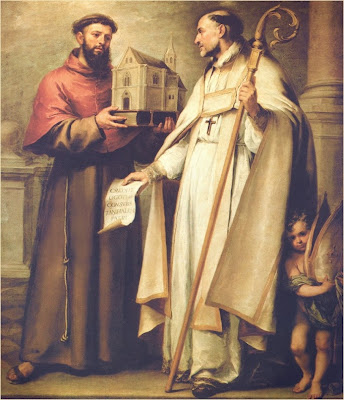From the Proper Offices of Franciscan Saints in the Liturgy of the Hours:
Almighty God, as we celebrate the birthday of Saint Bonaventure the bishop grant us the grace to profit frim his excellent teaching and always to imitate the ardor of his love. We ask this through our Lord Jesis Christ, your Son, who lives and reigns with you and the Holy Spitit, one God, for ever and ever.
From Wikipedia:
Life
He was born at Bagnoregio in Latium, not far from Viterbo, then part of the Papal States. Almost nothing is known of his childhood, other than the names of his parents, Giovanni di Fidanza and Maria Ritella.
He entered the Franciscan Order in 1243 and studied at the University of Paris, possibly under Alexander of Hales, and certainly under Alexander's successor, John of Rochelle. In 1253 he held the Franciscan chair at Paris. Unfortunately for Bonaventure, a dispute between seculars and mendicants delayed his reception as Master until 1257, where his degree was taken in company with Thomas Aquinas. Three years earlier his fame had earned him the position of lecturer on the The Four Books of Sentences—a book of theology written by Peter Lombard in the twelfth century—and in 1255 he received the degree of master, the medieval equivalent of doctor.
After having successfully defended his order against the reproaches of the anti-mendicant party, he was elected Minister General of the Franciscan Order. On 24 November 1265, he was selected for the post of Archbishop of York; however, he was never consecrated and resigned the appointment in October 1266. It was by his order that Roger Bacon, a Franciscan friar himself, was interdicted from lecturing at Oxford and compelled to put himself under the surveillance of the Order at Paris.
Bonaventure was instrumental in procuring the election of Pope Gregory X, who rewarded him with the title of Cardinal Bishop of Albano, and insisted on his presence at the great Council of Lyon in 1274. There, after his significant contributions led to a union of the Greek and Latin churches, Bonaventure died suddenly and in suspicious circumstances. The Catholic Encyclopedia has citations which suggest he was poisoned. The only extant relic of the saint is the arm and hand with which he wrote his Commentary on the Sentences, which is now conserved at Bagnoregio, in the parish church of St. Nicholas.
He steered the Franciscans on a moderate and intellectual course that made them the most prominent order in the Catholic Church until the coming of the Jesuits. His theology was marked by an attempt completely to integrate faith and reason. He thought of Christ as the “one true master” who offers humans knowledge that begins in faith, is developed through rational understanding, and is perfected by mystical union with God.
From the Catholic Company:
St. Bonaventure is clearly a marvelous saint, but what makes him relevant today? St. Bonaventure taught a very important lesson during his life which must continue to be taught. He proposed that theology can only be done rightly with love of God and desire of union with him. Essentially what this means is that theology ought to be a practical science. Theology cannot or should not simply be thinking about God and who or what he is. Theology done rightly will lead one to a deeper piety and love of God. I think, and Bonaventure would probably agree with me, that today many theologians do not engage theology in the practical way St. Bonaventure advocates for. I find that this results in some off the wall theological ideas and arguments. St. Bonaventure’s ideas still need to be remembered for anyone who seeks to learn more about who God is and what he is, or other theological inquiries.
Read the rest here.






1 comment:
I, too, pray the Franciscan supplement. It's a tad beat up.
Post a Comment